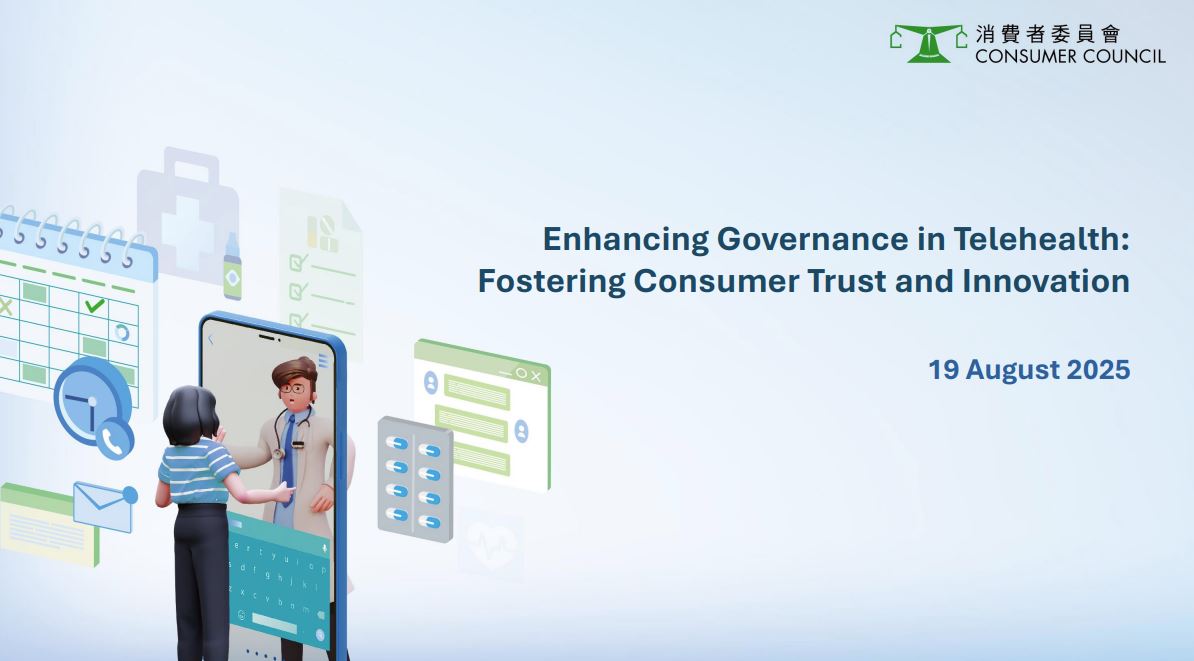
Hong Kong’s telehealth services need to be overhauled to plug key loopholes, including a patchy regulatory framework, unclear provider liabilities, and insurance coverage ambiguities, the Consumer Council urged on Tuesday.
Telehealth, including remote medical consultations, prescriptions, and health monitoring, has grown increasingly popular in Hong Kong, particularly during and since the COVID-19 pandemic.
The consumer watchdog conducted a comprehensive investigation of the sector from May and October last year, surveying 833 medical practitioners and 14 telehealth providers, reviewing the digital platforms of 19 telehealth service providers and polling 840 consumers.
It found that 48.5 percent of public healthcare institutions and 49.5 percent in the private sector in Hong Kong offered telehealth options.
The council said telehealth platforms run by patients’ organizations, private insurers and traders lacked dedicated regulatory oversight -- a significant governance gap that needs to closed immediately.
Chairman Clement Chan Kam-wing said Hong Kong requires unified standards covering the entire telehealth ecosystem, including public and private hospitals of all medical disciplines, pharmacists, allied health professionals and even physiotherapists.
He called for comprehensive reform to ensure consistent quality services across the board.
Other systemic flaws exposed in the findings included regulatory inconsistencies, murky liability boundaries, and pervasive insurance reimbursement ambiguities. There were contradictory disclaimers as four of the 19 service providers denied their services were diagnostic or therapeutic tools despite having issued medical certificates and prescriptions.
In addition, eight of the traders had used conditions of service to waive legal responsibility for potential harm to patients, or losses arising from consultations, while 10 of them offered customers no clarity on insurance reimbursement arrangements.
ALSO READ: HK, Macao consumers warned of cross-boundary e-commerce risks
Council member Selwyn Yu Sing-cheung said the city’s lax certification regime has given rise to critical consumer risks, such as ambiguous service information, limited service choices, inadequate operational support, and privacy and security vulnerabilities.
According to the survey, among the 13 active telehealth platforms polled, only one of three that used self-developed telehealth tools claimed to have an accreditation on privacy protection. Among 10 others opting for third-party platforms like WhatsApp, Zoom or Teams, just four claimed to have acquired related accreditation.
Yu noted that the United States bans platforms like Facebook for telehealth, and Hong Kong’s comparatively loose provider certification makes it more urgent for uniform quality standards to be enforced to enable the industry to move forward in the right direction.
The survey said major telehealth markets like the Chinese mainland, Australia, Canada, Singapore and the US require standardized digital consent protocols as Hong Kong lacks such defined telehealth consent standards.
According to Chan, consumers require upfront visibility of doctor specialties, consultation schedules, complete pricing and medicine delivery terms, and such critical details can empower “informed decisions” and enable proper service evaluation.
The council called for revised telehealth guidelines, legislation clarified responsibilities, an industry-vetted certified provider whitelist, and enhanced consumer transparency and public education campaigns.
Experts have proposed cross-sector collaboration in compiling a whitelist of certified providers, involving the Hospital Authority, data security regulators and industry representatives. They hope this would include mandatory disclosures of provider certifications, approved communication tools, technical support contacts, and clear customer service and complaint channels.
Between January 2020 and June this year, the council said it had dealt with seven telehealth-related complaints, with half of them involving undelivered services or refunds being withheld
In one case, a patient was charged an additional HK$550 ($70.52) after having paid HK$400. The clinic later explained that the HK$400 was only a booking fee and did not cover the consultation or medication. Chan described such practices as “potentially deceptive”.
READ MORE: HKSAR govt mulls cooling-off period after medical group’s shutdown
“We expect a substantial expansion of telehealth services in the near future,” he said, citing the growing integration of the Guangdong-Hong Kong-Macao Greater Bay Area that will inevitably increase demand for remote health consultations from Hong Kong residents.


